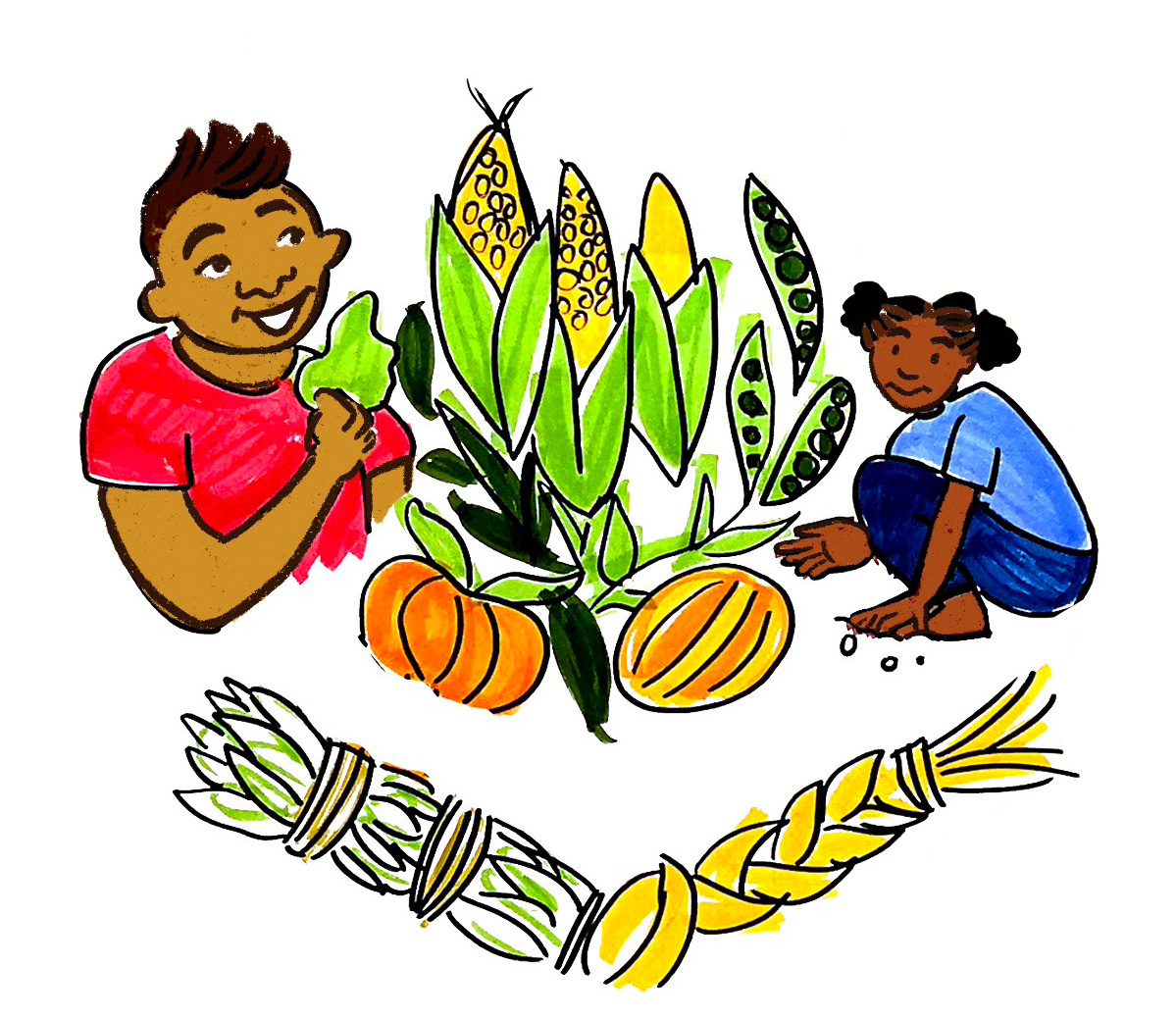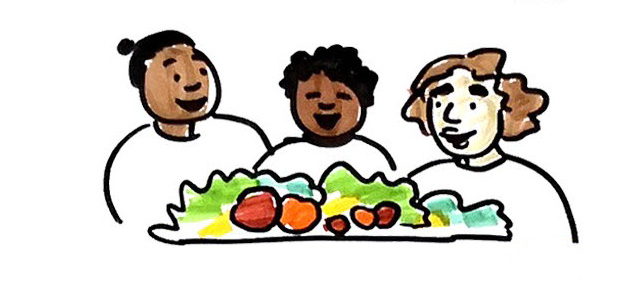Encouraged by the desire of non-Indigenous school food community members to have a space to convene, share and learn together on their journeys to Truth and Reconciliation, at the beginning of 2023 F2CC embarked on a new knowledge-sharing activity: the Cultivating ReconciliACTION in School Food Programming virtual 3-part pilot series. This post shares an overview of the series including the materials and resources that were explored as part of it, along with lessons learned and what’s next.
F2CC envisions meaningful school food environments where all students feel welcomed and nourished in body, mind and spirit. We also acknowledge that Canada’s colonial history includes many traumas created by both residential schools and harms done through food, and many of these systems persist today.

Embracing the Six actions of ReconciliACTION presented by the Truth and Reconciliation Commission in 2015 – learn, understand, explore, recognize, take action and teach others- we curated the series topics and resources accordingly while considering attendees’ own unlearning, learning and relearning journeys, which were quite diverse. Nearly half of registrants indicated they were just starting their learning journeys; while several others told us “I have heard or attended multiple events/books/articles” about Canada’s colonial histories with Indigenous communities and Indigenous food sovereignty.
The series took place over February, March and April 2023. One 90-minute facilitated virtual session was hosted monthly by 2 members of our F2CC team, Claudia Páez-Varas, Grant and Evaluation Coordinator, and Jesse Veenstra, Executive Director. Through the series, we aimed to create a safe space to reflect, share, encourage and learn in the school food context. To maximize the experience, participants were asked to allocate additional individual time to review shared materials and reflect on them before each session. Over the 3 months, participants were asked to dedicate a combined total of at least 7-10 hours for both the virtual sessions and personal learning and reflection.
We selected the material shared during the series to guide conversations and inform and provoke rethinking and thinking differently. School food was at the centre of the series while learning about and reflecting on Western and Indigenous paradigms, intersectionalities, privilege and power, critical race theory in school, critical pedagogy, allyship and other relevant topics to practice reconciliACTION in school food were explored. Below we have provided the materials shared during each of the three sessions in hopes that more people can find them helpful in their own paths. Please note: The series structure and materials are a reflection of where the session hosts were in their own learning, along with what participants indicated in their registration surveys. This list of materials is not static and we expect will change based on individual group knowledge and experiences, and as our understanding deepens and grows.
Methaphysica: Intersecting Western and Native Ideas video recorded presentation
By Professor Emeritus Leroy Little Bear | 1-hour watching
The Indigenous Title and the Doctrine of Discovery blog post
By Indigenous Corporate Training | 5 min reading
“Showing up in a Good Way” online course module
Introduction module of the Waven Relations online course by the University of British Columbia’s Faculty of Applied Sciences and Faculty of Land and Food Systems | 6.5-min watch
Positionality and Intersectionality
By the Open Library
Wheel of Privilege and Power digital document
By the Immigration, Refugees and Citizenship Canada
How contact and colonialism have affected Indigenous foodways? video recorded
Presentation By Dr. Daniel Sims | 1-hour watch
In Relation online course module
Module 7 of the Waven Relations online course by the UBC’s Faculty of Applied Sciences and Faculty of Land and Food Systems | 6.5-min watch
Wanna be an ally? digital living text
By Elwood Jimmy and Vanessa Andreotti posted on the Gesturing Towards Decolonial Futures website | 5 min read
By Native Land Digital
Native-land 2019 Teacher’s Guide digital document
By Native Land Digital
Why you shouldn’t be afraid of critical race theory
Episode 18 of Don’t Call Me Resilient podcast | 35 min listen
By Unreserved CBC podcast | 15.5-min read
Truth and Reconciliation Commission of Canada: Calls to Action digital document
Especially the sections about Education (pages 1-2, recitals 6-12) and Education for Reconciliation (pages 7-8, recitals 62-65)
ReconciliACTION Plan webpage
By the National Centre for Truth and Reconciliation, University of Manitoba
My ReconciliACTION-Plan template digital document
By the National Centre for Truth and Reconciliation, University of Manitoba
Land-based Learning Resource List blog post
By Christina Smith, compiled as part of Farm to School Month 2021 | varioius formats and lengths
Exlporing Land-based learning and food system education webinar & discussion guide
By Farm to Cafeteria Canada | (1 hour watch)
Responsibilities and reflections: Indigenous food, culture, and relationships peer-reviewed digital article
By Dr. Tabitha Robin Martens. Canadian Food Studies (2018)
What is an Indigenous Medicine Wheel? blog post
By Indigenous Corporate Training | 5-min read
Shared learning resources for F2CC Team & Partners blog post
By Farm to Cafeteria Canada this is a living list of resources | varioius formats and lengths
 Participants mostly identified as educators and community partners, followed by school food providers, school support workers and community volunteers within schools.
Participants mostly identified as educators and community partners, followed by school food providers, school support workers and community volunteers within schools.
The series registrants came from diverse experiences, and their learning expectations differed. Some registrants were aiming to learn more about Indigenous food and foodways. Others wanted to know how to build meaningful relationships with Indigenous peoples and how to teach students to cultivate those relations and engage students in the ongoing truth and reconciliation process.
The registrants also shared challenges and uncertainties with school food programming and Indigenous relations. Among those, they mentioned how to avoid appropriation and teach in a “good way” in their daily school activities, deal with institutional barriers that prevent students’ engagement in traditional food practices, being a new immigrant to Canada and unfamiliar with the colonial history, balancing a busy work agenda, and how to connect with Indigenous community members in a “good way.”
During the series, we requested feedback twice. After the first session we asked particpants to answer a short survey to tailor the series format to their preferences. At the end of the third session, we asked again to help us think about what a second series could look like.
The following are part of our learnings:
For the F2CC team, this was a unique experience that allowed us to reflect on our own biases and assumptions and continue to advance our own learning. We are grateful for those who expressed interest and joined us on this journey. We also deeply value your feedback to help improve future knowledge exchange events and materials. We heard that more opportunities to share and learn are necessary and we are actively exploring how we can help make that possible.